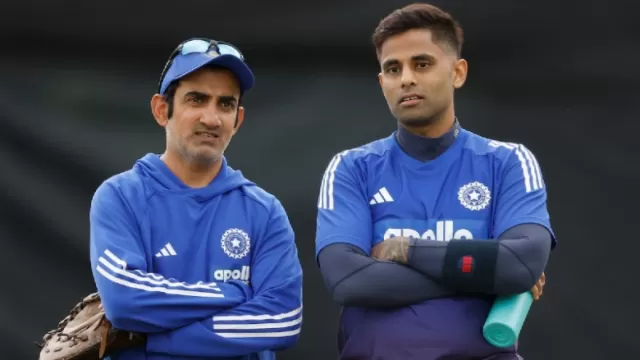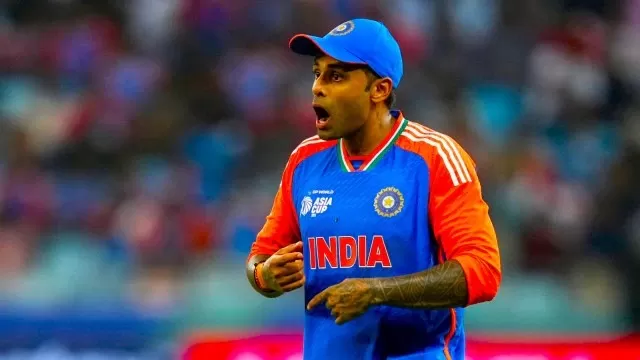Although he continues to display his characteristic confidence and composure at the crease, Suryakumar Yadav has entered a concerning slump with just 126 runs in his last 14 T20-international innings. The upcoming series against Australia thus stands as much more than another fixture—it is a critical juncture for the Indian captain in both his batting and leadership roles.
Behind the friendly smile and laid-back demeanour lies a growing tension: the shadow of Shubman Gill, a sensational young talent knocking at the door, and the looming spectre of the next T20 World Cup just months away. If Suryakumar does not turn things around soon, the story of potential could shift into one of decline.
It is worth noting that while his form has dipped significantly, Suryakumar’s approach and intent have not. He still walks out with energy, still displays his range of strokes, and still carries the responsibility of captaincy with ease. Yet the results haven’t followed, and the time to reverse that trend is now.
Statistical red flags and mounting scrutiny
The numbers are unignorable. Just 126 runs in his last 14 innings, an average hovering around the teens, and no fifty-plus score to his name for some time—these are clear indicators that his T20 batting has faltered. In contrast, he produced 717 runs in 16 IPL innings with a strike rate near 168 just months ago, highlighting the mystery of this dip.
Team management and senior figures have publicly backed his aggressive style, suggesting that his form slump is temporary and acceptable within the team’s larger framework. But former players and critics believe a continued poor run will create internal scrutiny if it persists any longer.
The Australia series: a make-or-break assignment
What elevates this series in Australia from routine to major is the confluence of factors around Suryakumar’s career. Firstly, Australia’s conditions—pace, bounce, seaming tracks—could suit his game perfectly. Several analysts believe that the bounce and pace will allow him to express his natural skills and regain confidence.
Secondly, the ageing captain is confronting the dual challenge of reviving his batting while maintaining his leadership position. With younger names like Shubman Gill rising, tolerances for lean patches will be short. Another poor series could turn career momentum into a point of speculation rather than celebration.
Leadership pressures and team dynamics
While his batting has slowed, Suryakumar’s leadership has been solid—India recently clinched the Asia Cup under his watch. But the paradox remains: a captain who is winning matches yet not scoring runs. That split becomes dangerous when results aren’t consistently dominant and the focus shifts to individual contributions.
Moreover, the team’s young batting core—Tilak Varma, Axar Patel and Abhishek Sharma—are breaking through, and selective pressures are real. Performance plus leadership will now be under the microscope. A failure with both bat and captaincy could invite scrutiny not just of him, but of the structure around him.
Underlying issues and technical clues

Coaches and analysts point to subtle patterns: fewer boundaries, less dominance of opposition bowlers, and slower conversion of starts. Suryakumar’s trademark 360-degree range remains, but the output has significantly declined in terms of volume and impact.
However, interestingly, his style appears intact: he isn’t scared, he isn’t tentative. The issue seems less about technique and more about rhythm, timing, or perhaps the mental weight of captaincy. Some believe the additional leadership responsibilities may have impacted his natural flow at the crease.
Why it matters for the bigger picture
With the T20 World Cup barely months away, a strong showing in Australia rewards not just the individual but the team plan. India need their top batsman to fire, their captain to lead from the front, and for the batting unit to present stability. A misfiring captain makes the batting lineup more vulnerable and unsettled.
In a sport where individual form increasingly intersects with leadership perception, Suryakumar’s form slump is more than a personal problem—it is an institutional warning. The Australia series is a vivid crossroads: revive and reinforce your value, or risk drifting into questions and alternatives.
What could salvage the situation
A return to his expansive stroke-play on Australian wickets would go a long way. With bounce and pace favourable, early confidence-building innings could reset both form and perception. If Suryakumar trusts his natural game and avoids over-correction, the slump may simply pass.
Team management backing his approach—rather than tinkering with it—will also matter. The spotlight is firmly on him now, and the stage is set for either resurgence or regret. A couple of big innings could flip the narrative overnight and re-establish him as India’s most dependable T20 batter.
Conclusion: Form, fitness and future
Suryakumar Yadav remains one of the most imaginative and destructive T20 batters India has ever produced. But even the sharpest blades need to be maintained. This Australia series offers a testing ground like no other. If he emerges firing, the narrative will reset. If he doesn’t, the discussions will deepen.
For fans, selectors, and the team management, the message is clear: form is not infinite, and leadership is not immune. The Indian captain arrives in Australia under pressure—but also with a golden chance to remind everyone just how dangerous he can be when he’s at his best. The next few matches could define whether this is merely a rough patch or the start of something far more serious.
Also Read: Bharat Inspires Telugu Titans’ Win Over Patna Pirates


Disclaimer
Possible11 is a sports news and analysis platform designed purely for entertainment and educational purposes. All match previews, player insights, and team analyses are based on publicly available information and expert opinions. We do not promote or support betting, gambling, or real-money gaming in any form. Users are encouraged to enjoy our content responsibly and use it for informational purposes only.





















Give Your Feedback